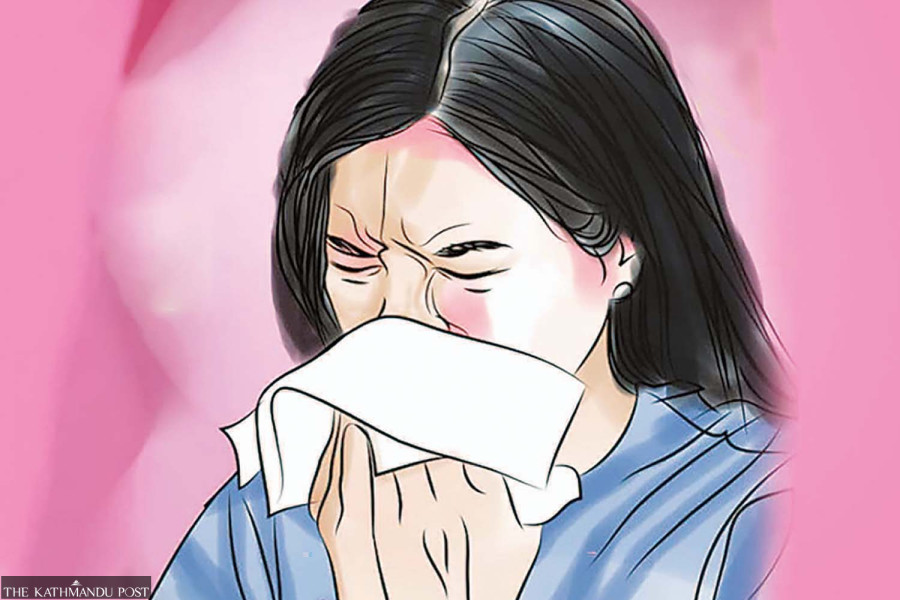Health
Rise in number of patients with both influenza and pneumonia
Coinfection of viruses and bacteria blamed for rise in influenza, pneumonia cases.
Post Report
Every day, around five children seriously ill with pneumonia are admitted to Patan Hospital. Several others, infected with influenza and in serious condition, seek outpatient care, pediatric doctors at the hospital said.
“Compared to the same season of previous years, the number of patients infected with both influenza and pneumonia has risen this time,” said Dr Srijana Shrestha, professor of paediatrics at Patan Hospital. “Some patients are brought to hospital in serious conditions, who require immediate intensive care.”
Though winter is flu season, when thousands of people across the country get infected with multiple respiratory viruses, multiple doctors the Post talked to said they noticed an alarming surge in influenza and pneumonia cases this time. Although an extensive study has not yet been carried out to determine the cause of the spike, they suspect coinfection of viruses and bacteria is responsible for the rise in pneumonia cases.
Major hospitals—Bir Hospital, Kanti Children’s Hospital, and others—have reported flare-ups of respiratory illness, including pneumonia. Along with small children, the number of adults and elderly suffering from fever, cough, and the common cold has risen sharply in recent weeks.
“It has already been several weeks since the number of respiratory illnesses, including pneumonia, started rising,” said Dr Sumit Agrawal, spokesperson of the Kanti Children's Hospital. “Even parents of infected children are found carrying respiratory viruses.”
Viruses causing influenza are highly contagious, which spread quickly in the communities and affect the lungs of infected patients. These diseases can cause fever, cough, body aches, and sometimes vomiting and diarrhoea, as well as pneumonia. If left untreated, they can lead to death.
Pneumonia, an infection of the lungs caused by various types of bacteria, viruses and fungi, is the number one killer of children under five in Nepal. It kills more children annually than malaria, tuberculosis and HIV combined.
Fifteen percent of the total under-five mortality is caused by pneumonia, according to the World Health Organisation.
Doctors say pneumonia caused by bacteria is deadlier than that caused by viruses, and children under five and people above 65 years of age are highly vulnerable to the disease.
Thousands of people throughout the country get infected from pneumonia every year. The average cost of families for a case of hospitalisation is Rs13,250, nearly half the average Nepali household's monthly expenses, a study carried out by Pneumo Nepal shows.
The study, which was carried out at Patan Hospital, Kanti Children's Hospital, Mission Hospital in Palpa, Bheri Hospital in Nepalgunj and BP Koirala Institute of Health Sciences, shows that the unexpected costs frequently push families into poverty.
Past studies show that 60 to 70 percent of pneumonia cases are caused by viral infections.
“Even young, infected people are becoming seriously ill and seeking hospital care,” said Dr Ashesh Dhungana, a pulmonologist and a critical care physician at Bir Hospital. “Anyone can get infected with respiratory viruses, but those with compromised immunity are highly vulnerable to severe illness.”
Doctors said that the actual number of people infected with seasonal influenza could be far more than what is recorded, as not all cases reach hospitals and undergo testing. Sometimes, even doctors do not think it necessary to carry out testing as there is no specific treatment for the infection.
Experts say early diagnosis is crucial for the better outcome of treatment in seasonal influenza cases. Patients recover early if they are treated in time, according to them. They advise parents not to delay seeking medical attention if the child’s fever does not subside after three days, and avoid buying over-the-counter drugs.
They also ask people to stay away from crowds, maintain hand hygiene and follow public health measures, as they did during the coronavirus pandemic.




 13.12°C Kathmandu
13.12°C Kathmandu














